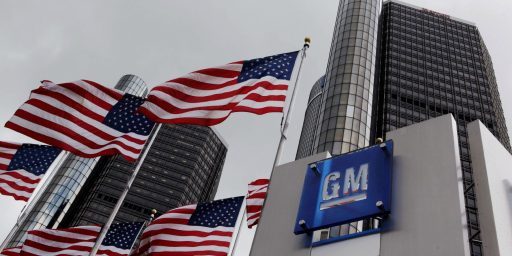The Dodd Proposal
Senator Chris Dodd, through whom any bailout proposal from the Treasury must go, has offered an alternative to the Paulson plan:
The legislation requires Treasury to take an equity stake equal to the purchase price of the assets being bought. If the company isn’t publicly traded, the government would take senior debt instead, placing it in the front of the line of debt holders for repayment in the event of a bankruptcy.
Dodd’s proposal also would create a five-member oversight board to supervise the Treasury secretary’s purchase and sale of distressed mortgage debt.
It would consist of the chairmen of the Federal Reserve, Federal Deposit Insurance Corp. and the Securities and Exchange Commission as well as two members from the financial industry designated by congressional leaders.
The board would be authorized to set up a so-called credit review company consisting of Treasury employees to study the soundness of the purchases. Under the plan, the government would be required to obtain an equity stake equal to the value of the debt that is purchased from the companies, including those whose shares are not publicly traded. The Treasury secretary would also be required to issue weekly public reports on the amount of assets bought and sold by the U.S.
There are some other provisions, too, but this seems to be the bulk of it. I’m a bit leery of the US government obtaining equity stakes in private industry, but I’m totally on board with making the Federal government “first in line” in the case of bankruptcy for firms that accept a bailout. I am also on board with an oversight board (though not so much with the “two members from the financial industry”) and am 100% in favor of requiring weekly reports showing the valuation of any debts purchased.
My gut check is that this seems like a step in the right direction. I’ll probably post some more commentary later after I’ve had time to digest.
UPDATE (James Joyner): Blake Houshell observes,
You’d have to think that even President George W. Bush and Treasury Secretary Hank Paulson, who sent Congress a bare-bones bill with zero oversight provisions, had to see this coming. In fact, I think they want Democrats to take this legislation and run with it. Why? Because once the Democrats put their stamp on the bill, they’ll no longer be able to hang any failure around Bush’s neck. It’ll be their failure, too.
Could be. Certainly, it’s a bipartisan mess, reflecting decades-only policy consensus. Mostly, though, people blame presidents for the economy unless they’re very clever at shifting the blame or, as was the case with Clinton and Newt Gingrich, their foes are particularly inept.






Dodd’s response is interesting, but its flawed in that is begins from the assumption that a bailout is needed. These banks could all be reorganized in bankruptcy without harming the depositors. Yes, the owners will be wiped out, and yes the creditors will have their debts converted to equity at twenty cents on the dollar or less, but that’s not a national problem. There’s nothing the Treasury can or should do to shore up a financial institution’s insolvent balance sheet. The Treasury should only act to inject liquidity to aid in price-finding.
Unfortunately the problem today is not liquidity or price-finding, it’s insolvency. Bankruptcy for the financial institutions is appropriate.
Jeffrey argues something I think is interesting, and I admit my knowledge of financial institutions and how they work is limited, but I do wonder why most of the plans do begin with the assumption that a bail out has to happen.
Are there are methods of saving the various financial institutions from complete insolvency without the taxpayer picking up the tab, if so what are they, and is anyone with power proposing them?
That said, if there is a bailout I like the idea of some kind of oversight board being involved-how it is formed and who should make up its members is debatable, but I like this idea much better than handing over a blank check.
My concern with the prospect of a bail out is that it won’t discourage institutions in the future from taking such risks if they think the taxpayer will step in and save their butts again.
You can’t have a step in the right direction when you are running headlong in the wrong direction. This bailout costs too much, wont prevent the next crisis, and is questionable in preventing the current one. It is a more bad policy on top of already bad policy and both private and public fiscal mismanagement.
Steve,
I am starting from the position that a bailout is going to happen, period. I agree with you that the wisdom of any bailout is questionable, as I mentioned in my last post. I think that Michael’s suggestion in the comments to that post that we loan money to banks using debt as collateral isn’t the worst idea in the world. However, it’s not going to happen. Letting them fail isn’t going to happen. These institutions are going to be bailed out–that’s just political reality. So the question is, do we throw in some oversight and punitive measures or don’t we?
I’m no economist, but how does that help the company’s bottom line? If the government is first in line to get repayment of the money they put up, how is that different from the money simply disappearing in the first place? If I was an investor or creditor to that company, either way I would see the same return (or lack thereof).
How much would this dilute the value of the rest of the shares of the company? Will that have a ripple effect on the rest of the economy?
Diluting the existing ownership is the entire point. The fed rides to the rescue, and all the equity holders get wiped out or nearly so. Debt gets converted to equity. That’s how bankruptcy works.
We are not trying to rescue the owners of banks. That would be retarded. The only reasonable motivation is to protect depositors and creditors.
But aren’t there other investments that depend on the values of these companies? Like IRAs and 401Ks, that may contain shares in these companies. I’m not saying it’s a bad thing, I just don’t know how much a dilution would effect things we’re not trying to effect.
I’m not certain about this either:
If I loan money to the bank of Dewey Cheatam and secure the loan, I am not sure how anybody can get in front of me. I have a property right in that security that I don’t believe the government can deprive me of without just compensation. Now, the government could possibly force me to accept the present value of my collateral, but that wouldn’t put the government in the front of the line.
I assume what the government would want is to maintain the first position on the money it lends. An example would be a bank that lends money to a consumer to purchase an automobile obtains a “purchase money security interest,” first lien position on the auto because if the bank had not advanced money to purchase the auto, the auto would not exist as collateral for anybody. Another example might be a roofing contractor who gets a construction lien on the value of the roof.
In both of these examples the lien-holder steps in front of older lien holders because their money or labor can be traced to something new. The government does not appear to be lending money to create something new, but to provide liquidity to existing operations. I don’t see how it could claim to be in a position in front of earlier debt holders.
If anybody can explain what I am missing, I would appreciate it.
See my latest post. The answer would appear to be, “No, Mother fucker!”
(Imagine Samual L. Jackson saying it)